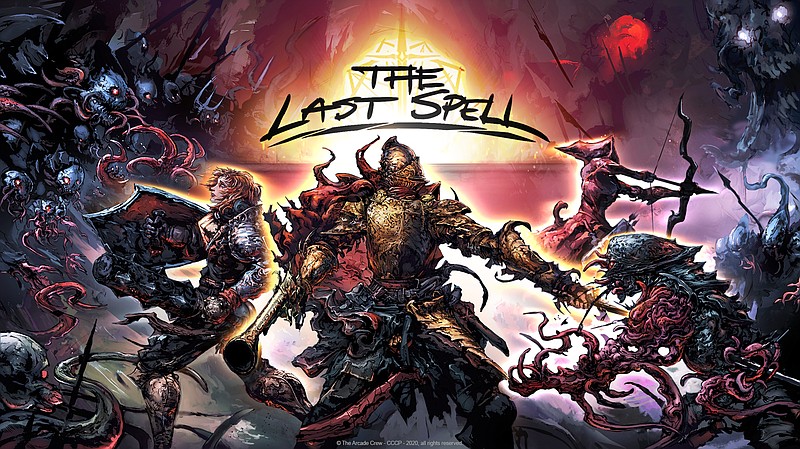"The Last Spell" entertains with a pleasing mixture of turn-based role-playing and rogue-like elements, with a bit of tower defense thrown in.
Set in a post-post apocalyptic scenario, the video game gives us a few valiant heroes attempting to defend the world's last remaining haven -- a tiny, ramshackle village besieged by an onslaught of what seems like the entire forces of hell.
Humanity has collapsed. After a magical arms race that pushed humanity to the brink, the unimaginable happened. The magical equivalent of a thousand nukes has gone off, destroying 95% of the world's population.
If it was only that, the world might recover somewhat but, in the blast, something broke open, and hellish monsters have poured across the land.
Desperate to save what little remains, humanity's remnants have gathered at the world's last haven to cast a final spell that will erase all magic from the world, forever. But the mages must be protected for 12 days and nights as hordes of abominations swarm the town.
At the start of "The Last Spell," players control three heroes. At night, monsters will swarm one side of the town, and the heroes must be positioned to repel the enemy. At dawn, the score from the night is calculated — how many monsters were killed?; how much damage did they do to the town and heroes? — and rewards are given out. Those rewards are used to buy equipment, fix up the town, create defenses and hire more heroes.
The rogue-like elements come into play because each hero has randomized starting values and background traits (such random number generating elements in a game are called RNG). A shop to buy weapons, armor, potions and trinkets has a randomized selection. And when heroes level up, they are given a randomized choice of upgrades to select.
This leads to a rather RNG-dependent experience, at least at first, and it's not likely (indeed, probably not possible) to survive all 12 nights on the first play-through.
The other part of the game is the meta-progression of "unlocks." Killing monsters and making achievements earns rewards from two deities (one dark, one light, named Schaden and Freude). These achievements can be used to unlock new buildings, make more powerful weapons appear and improve traits of future heroes.
As each night passes, the waves of enemies attacking the town grow bigger and more powerful, and enemies start attacking the town from its other sides, requiring the heroes to split up. Eventually, more heroes can join (a maximum of six), but they'll always be outnumbered by the hundreds of enemies.
[Video not showing up above? Click here to watch » arkansasonline.com/1004spell/]
Heroes have action points that they can use to attack or to activate various abilities, and they have a certain amount of movement each turn. They also have health and mana (fuel) reserves. Some attacks cost just a single action point. Other, more powerful attacks can cost various combinations of action, mana and movement points.
Heroes must manage their limited pools of resources to kill monsters efficiently before they overwhelm the town.
There are no classes for heroes — skills are determined solely by equipment. Weapons include various physical, ranged and magic equipment. Weapons and armor have both rarity, material and levels, with rarer gear having various bonus abilities attached, similar to how equipment is found in games such as "Borderlands."
Success is about finding synergy with the right equipment on the right hero. For example, a hero that chooses armor and health upgrades when leveling could make for a good tank character to hold off the horde, while a character that focuses on critical hit chance and ranged damage would make a good bow user.
In a similar vein to "Loop Hero" (complete with pixel-art style of graphics), losing the game means starting over on Day 1 of trying to save Town No. 2 (and if you fail again, then Town No. 3, and so on). Your heroes and all they gained are wiped out, but the meta progression continues.
In fact, surviving the 12 days and winning the game is really just the beginning, because it's only then that the Apocalypse-level scenarios are unlocked, and it will take a number of play-throughs to unlock most of the game's content. A number of powerful weapon options (such as the pistol, great sword and druid's staff) will require dozens of hours of play to acquire.
‘The Last Spell’ (Early Access)
Platform: Windows
Cost: $19.99
Rating: Teen for cartoonish violence, blood
Score: 9 out of 10
"The Last Spell" entered early access in June, but has already received major updates, as the France-based indie developers are actively finalizing the game based on the feedback from players. A development road map indicates that new maps, bosses, enemies and levels are planned through 2022.
The game is already great fun and in a playable, quite polished state (some Early Access games are disappointingly raw) and definitely worth checking out.
